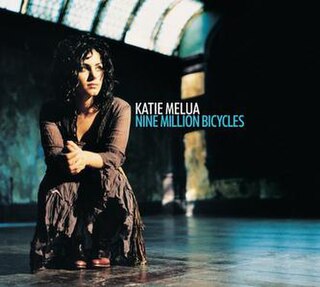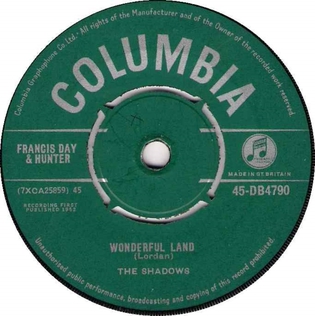Related Research Articles

Wizzard were an English rock band formed by Roy Wood, former member of the Move and co-founder of the Electric Light Orchestra. The Guinness Book of 500 Number One Hits states, "Wizzard was Roy Wood just as much as Wings was Paul McCartney." They are most famous for their 1973 Christmas single "I Wish It Could Be Christmas Everyday".
British Hit Singles & Albums was a music reference book originally published in the United Kingdom by the publishing arm of the Guinness breweries, Guinness Superlatives. Later editions were published by HiT Entertainment. It listed all the singles and albums featured in the Top 75 pop charts in the UK. In 2004 the book became an amalgamation of two earlier Guinness publications, originally known as British Hit Singles and British Hit Albums. The publication of this amalgamation ceased in 2006, with Guinness World Records being sold to The Jim Pattison Group, owner of Ripley's Believe It or Not!. At this point, the Official UK Charts Company teamed up with Random House/Ebury Publishing to release a new version of the book under the Virgin Books brand. Entitled The Virgin Book of British Hit Singles, it was first published in November 2008 with a separate albums book and second edition being published over the next couple of years.
Warwick Records is a British record label active in the 1970s and early 1980s, established by Ian Miles, which specialised in producing song compilations that were sometimes given away as 'promos' with other products, such as magazines. Warwick was also a TV-advertised budget record label, and was distributed by Multiple Sound Distributors in the UK.

Michael Philip Batt is an English singer-songwriter, musician, arranger, record producer, director, and conductor. He was formerly the Deputy Chairman of the British Phonographic Industry.

"Bright Eyes" is a song written by British songwriter Mike Batt and performed by Art Garfunkel. It was written for the soundtrack of the 1978 British animated adventure drama film Watership Down. Rearranged as a pop song from its original form in the film, the track appears on British and European versions of Garfunkel's 1979 Fate for Breakfast and on the US versions of his 1981 album Scissors Cut. "Bright Eyes" topped the UK Singles Chart for six weeks and became Britain's biggest-selling single of 1979, selling over a million copies. Richard Adams, author of the original novel, is reported to have hated the song. A cover of the song, performed by Stephen Gately, was later used explicitly in the Watership Down television series as its theme song.

Archie Bell & the Drells was an American R&B vocal group from Houston and one of the main acts produced by Kenneth Gamble and Leon Huff in the late 1960s before the duo formed their highly successful label Philadelphia International Records in 1971. The group's hits include "Tighten Up", "I Can't Stop Dancing", "There's Gonna Be a Showdown", "Girl You're Too Young" (1969), "Here I Go Again", "The Soul City Walk" (1975), "Let's Groove", "Everybody Have a Good Time" (1977), and "Don't Let Love Get You Down" (1976).
"On the Street Where You Live" is a song with music by Frederick Loewe and lyrics by Alan Jay Lerner from the 1956 Broadway musical My Fair Lady. It is sung in the musical by the character Freddy Eynsford-Hill, who was portrayed by John Michael King in the original production. In the 1964 film version, it was sung by Bill Shirley, dubbing for actor Jeremy Brett.

I'm the Man is the second album by English musician Joe Jackson, released in October 1979. Released shortly after Jackson's breakthrough debut, Look Sharp!, I'm the Man saw Jackson continue the style of his earlier album. Singles from the album included "I'm the Man" and "It's Different for Girls", the latter of which was his biggest UK chart single, peaking at number five on the UK Singles Chart.

"Nine Million Bicycles" is a song written and produced by Mike Batt for the singer Katie Melua's second album, Piece by Piece. It was released as the album's first single in September 2005 and reached number five on the UK Singles Chart, becoming Melua's first top five hit as a solo artist. It was a finalist for The Record of the Year prize, losing to "You Raise Me Up" by Westlife.
Dave and Ansel Collins are a Jamaican vocal/instrumental duo.
Robert John is an American singer perhaps best known for his 1979 hit single, "Sad Eyes", which reached number 1 on the US Billboard Hot 100.

"King of the Road" is a song written by country singer Roger Miller, who first recorded it in November 1964. The lyrics tell of the day-to-day life of a traveling hobo who, despite having little money, revels in his freedom, describing himself humorously and cynically as the "king of the road". It was Miller's fifth single for Smash Records. The song won Miller 5 Grammy Awards in 1966.
The Wombles were a British novelty pop group, featuring musicians dressed as the characters from the children's TV show The Wombles, which in turn was based on the children's book series by Elisabeth Beresford. Songwriter and record producer Mike Batt wrote and also performed many commercially successful singles and albums as 'The Wombles', including the TV series' theme tune. British Hit Singles & Albums jokingly referred to them as the "furriest act... are natives of Wimbledon Common, London". In 2011, the band played at The Glastonbury Festival.
"It's All Over Now" is a song written by Bobby Womack and his sister-in-law Shirley Womack. It was first released by The Valentinos, featuring Bobby Womack, in 1964. The Rolling Stones heard it on its release and quickly recorded a cover version, which became their first number-one hit in the United Kingdom, in July 1964.
"The Story of My Life" is a song written by Burt Bacharach and Hal David. It was published in 1957. It was recorded by Marty Robbins and reached number one on Billboard's country chart in 1958, and it became a number one hit song for Michael Holliday in the UK.

"Wonderful Land" is an instrumental piece written by Jerry Lordan and first recorded and released as a single by The Shadows in February 1962. It stayed at number one for eight weeks on the UK Singles Chart, a feat only Elvis Presley, the Shadows and the Archies managed in the whole of the 1960s.
"The Good, the Bad and the Ugly" is the theme to the 1966 film of the same name, which was directed by Sergio Leone. Included on the film soundtrack as "The Good, the Bad and the Ugly ", the instrumental piece was composed by Ennio Morricone, with Bruno Nicolai conducting the orchestra. A cover version by Hugo Montenegro in 1967 was a pop hit in both the US and the UK. It has since become one of the most iconic scores in film history.
"Hello Hooray" is a song written by Canadian singer-songwriter Rolf Kempf, and first recorded by Judy Collins on her 1968 album Who Knows Where the Time Goes. Its most famous rendition was by the band Alice Cooper, who covered it on their 1973 album Billion Dollar Babies. The Alice Cooper version was released as a single, and reached #35 on the Billboard Hot 100. It also saw success internationally, reaching #6 on the UK Singles Chart, #6 in the Netherlands on the MegaCharts, #13 on Germany's Media Control Chart, #14 on the Ireland chart, #16 on the Austria chart, and #95 on Australia's ARIA chart.

"How You Gonna See Me Now" is a song written by Alice Cooper, Bernie Taupin, and Dick Wagner, performed by Cooper and produced by David Foster. It was released on Cooper’s album, From the Inside.
"Teenage Lament '74" is a song by Alice Cooper. It was released on the album Muscle of Love, and was written by Cooper and Neal Smith.
References
- ↑ Rice, Tim; Rice, Jonathan; Gambaccini, Paul (1990), Guinness Book of British Hit Singles & Albums , Enfield, Middlesex: Guinness World Records and Guinness Publishing, ISBN 0-85112-398-8
- ↑ "Hits of the world - Britain", Billboard, vol. 91, no. 48, Nielsen Business Media, p. 47, 1 December 1979, ISSN 0006-2510 , retrieved 17 September 2009
- ↑ Kent, David (1993). Australian Chart Book 1970–1992 (illustrated ed.). St Ives, N.S.W.: Australian Chart Book. p. 46. ISBN 0-646-11917-6.
- ↑ Mike Batt memoirs